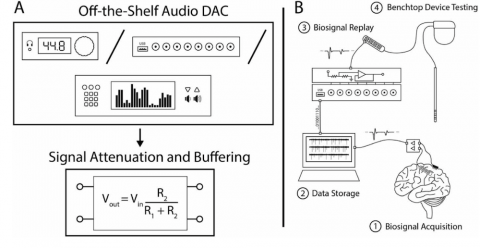Researchers are developing biomedical devices with embedded closed-loop algorithms for providing advanced adaptive therapies. As these devices become more capable and algorithms become more complex, tasked with integrating and interpreting multi-channel, multi-modal electrophysiological signals, there is a need for flexible bench-top testing and prototyping. NeuroDAC uses off-the-shelf audio equipment to construct a biosignal waveform generator capable of streaming pre-recorded biosignals from a host computer. By re-playing known, well-characterized, but physiologically relevant real-world biosignals into a device under test, researchers can evaluate their systems without the need for expensive in vivo experiments. Additionally, through a user adjustable impedance simulator, stimulation algorithm robustness to impedance mismatches or non-ideal electrode-tissue connectivity characteristics can be evaluated and debugged on the bench. Researchers can also replay recorded biosignals to examine how an algorithm under test would behave given the same biomarkers. By making the design of NeuroDAC open-source researchers aim to present an accessible tool for rapidly prototyping new biomedical devices and algorithms that can be easily modified based on individual testing needs.
Potential Impact
NeuroDAC provides an open-source platform for collaborative development of closed-loop biosignal processing algorithms, for example, closed-loop brain stimulation or responsive spinal cord stimulation. Researchers across institutional or geographical borders can test and debug their devices in an inexpensive, deterministic, and shareable benchtop development environment without compromising patient safety or incurring significant expense by tuning parameters in vivo.
